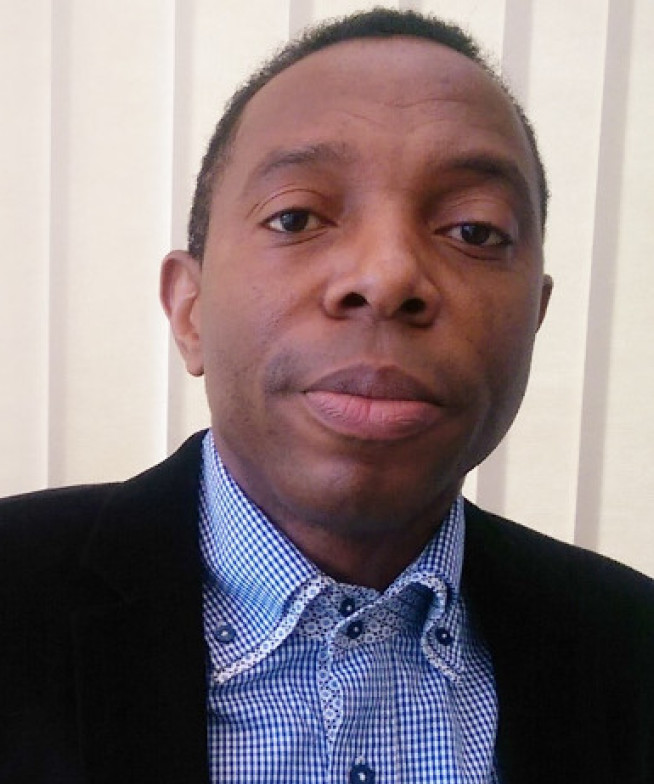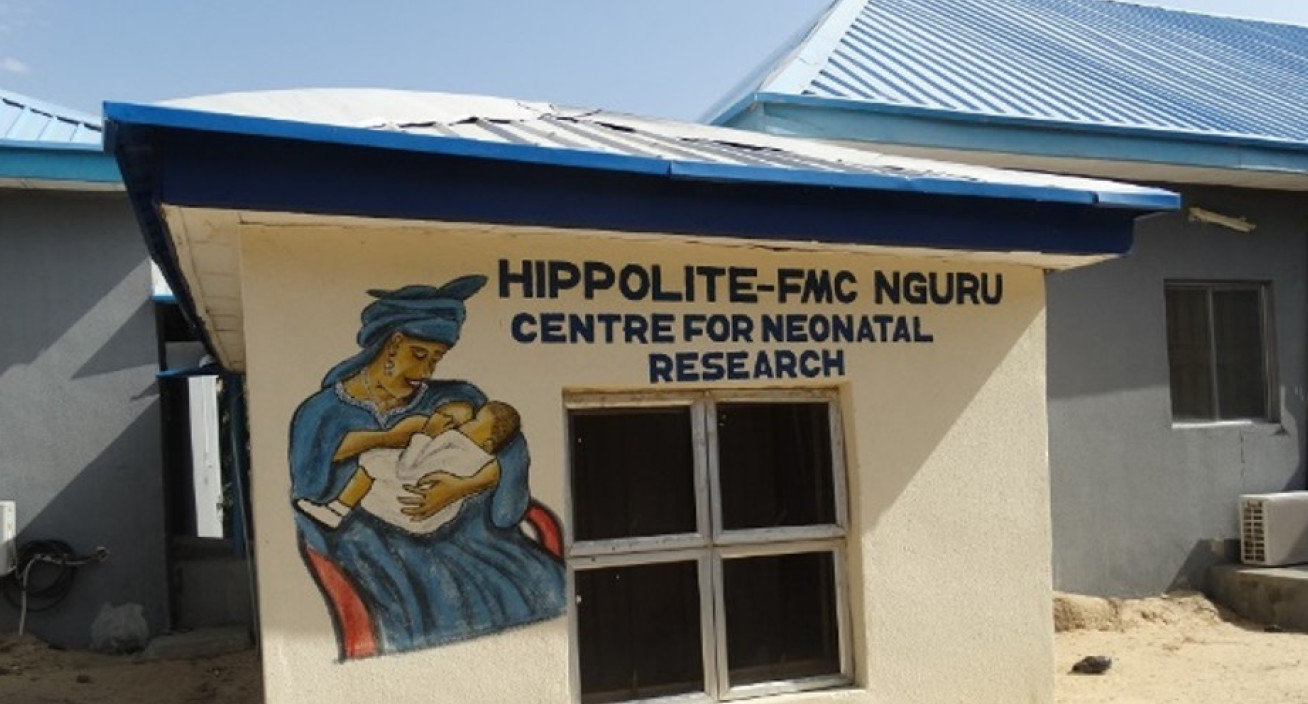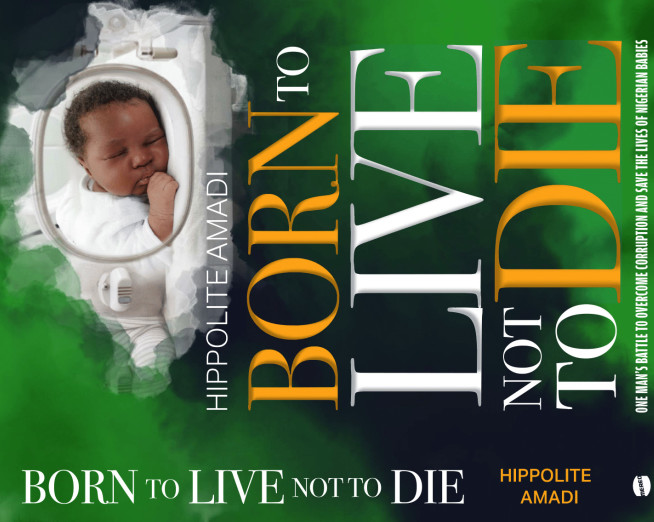
Hippolite Amadi is currently a Visiting Professor in the Department of Bioengineering at Imperial, but he studied both an MSc (2002) and a PhD (2006) here at the College as well, having studied Mechanical Engineering and Production Management in Nigeria beforehand.
In September 2023, Hippolite emerged as the winner of the 2023 Nigeria Prize for Science, in recognition of his innovative work on respiratory technologies which led to significant advances in the field of newborn and child health.
Read Hippolite’s professional profile.
We spoke to Hippolite about his remarkable life and career, from his time at Imperial to his work as Principal Consultant at the charity Neonatal Concerns for Africa.
Can you tell us about your studies at Imperial?
My studies at Imperial were very tough and challenging, but highly rewarding. I came to Imperial ten years after my first MSc degree in Nigeria, having been actively blazing a trail in a rare area of engineering-in-medicine, without an adequate medical background. I was fast becoming popular across Nigerian tertiary hospitals in my work with medical laboratory devices, and later neonatal incubators. I had discovered huge technological and knowledge gaps, which I suspected could be responsible for the high neonatal mortality rate in Nigeria. I needed the best academic and research training from the best possible place in the world to offer me the relevant knowledge to tackle this problem for Nigeria and Africa.
I secured admissions from top global universities including MIT-Harvard, and finally opted for Imperial. It was to become a six-year gruelling journey that was painfully self-funded. I was in full-time study at Imperial, but still had to travel to Nigeria frequently to offer services at a number of tertiary hospitals, in order to raise the necessary funds for my studies and my maintenance costs in the UK. I needed to work three times harder than normal as a student in order to achieve my training and research targets, and at the same time keep up with all the financial requirements.
It was almost unbearably difficult during the early days of my MSc taught course - to cope with the unfamiliar learning and lecture methods in a very intimidating academic environment. I had a lot to catch up on – which I was able to do, thanks to the great army of helpful members of staff at Bioengineering who assisted me. I was quick to notice how Bioengineering was stuffed with extraordinarily intelligent academics. I was frightened and challenged for my perceived knowledge deficiencies, but through it all, I received incredible assistance that enabled me to excel.
The study atmosphere around my research areas within Bioengineering, Mechanical Engineering and Musculoskeletal Surgery during the days was so electric that new findings and the development of new frontiers were common. Every material for my scientific investigation seemed to be available or within easy reach, far beyond anything I had known in the past. I immediately knew that Imperial was the place to enable me to hit the global cutting edge of my scientific quests, if only I was prepared to push myself to the limits. My supervisor had a lot of academic energy and the huge appetite for orthopaedic discoveries. Hence, he became the ‘oil’ that set my ‘wheels’ of research study on a rollercoaster that produced my PhD volume, eleven journal papers and far too many conference abstracts.
I did not get to embark on a neonatology-tailored research for my PhD. Therefore, my studies at Imperial opened up another challenge, but also a great opportunity to learn how I might achieve interdisciplinary skills transfer. In order to keep my neonatal passion alive, I aimed to learn all I could in orthopaedics to develop my medical research skills, whilst also devising ways of transferring these skills to execute my passion in neonatology research.
Sadly, I had little time for the pub and fun; howbeit, the occasional ones around the College and South-Ken areas sufficed.
What did you learn during your time at Imperial, in class or out?
My time at Imperial enabled me to learn virtually everything that transformed me from a ‘local professional champion’ into a ‘global superstar’. Top amongst these is the unique ability to multi-task in driving independent development projects to high standards of completion.
I learnt how to celebrate any achievement I make and use this as a review process for setting new targets – celebrations were refreshing, short-lived and propulsive into the next target. This has been reflected in the succession of my neonatal projects which have demonstrated and defined a complete package of how neonatal healthcare delivery may be successful across the entire region of the West African state of Nigeria.
Who did you find inspiring at Imperial and why?
There were a lot of inspiring people at Imperial, particularly within Bioengineering during my study days; however, Professor Anthony Bull and Emeritus Professor Robert (Bob) Schroter were rather phenomenal. I admired Anthony’s optimism and hard work as my PhD supervisor; his incredible ability in encouraging and stretching me to my limits, bringing out the best in the student and revealing one’s hidden potential. I admired Bob’s dynamism displayed in his area of respiratory mechanics. He gave me one invaluable piece of advice very early in my studies at Imperial, emphasising the confidence that I could gain with orthopaedics to transfer my skills to become the world’s best in neonatology research.
What is your fondest memory of your time here?
Professor Andrew Amis’s orthopaedic-biomechanics lab group was a bunch of clever but fun-loving pals at the time. Many of us were fond of each other and often enjoyed our lunch breaks together with hilarious jokes. Our most relaxed social event was our group’s yearly Christmas Dinner. I will always remember my first time at this event, being new in London. I arrived hungry and departed hungry because I couldn’t eat the food I ordered: it took me over one year to overcome the ‘cadaver effect’.
Another fond memory was my PhD viva in 2006. It was hilarious, relaxed and I thoroughly enjoyed it. The room was packed with top academics from Bioengineering, Mechanical Engineering and Musculoskeletal Surgery – all fearful top gurus. I was a bit nervous initially, but felt confident as I had been preparing for this for nearly 4 years. During the second session, I was called in and the examiner asked me, “so, do you know the result for your viva?” As I was walking in, I had looked in the faces and eyes of these experts, and didn’t see any doubt in their eyes; so it was easy for me to answer, “a Pass of course”. He responded, “Yes, you passed, congratulations”.
What is your favourite place at Imperial and why?
This would be the open lawn between the Queen’s Tower and the Library, especially during the summer times with my lunch in my hands. It was always refreshing to have a break here from ‘computational thunderstorms’ in the office and laboratories. When it was not so warm outside, the window seating areas in the senior dining room were my favourite places. These would allow me to appreciate nature and absorb the picturesque features of the lawn and its surroundings. Indeed, this brought peace and calmness after a very busy day at the laboratory.
Can you tell us a bit about the work you’re doing now?

Over the years I have built over twenty research collaboration units across Nigeria, and studied the deficiencies that lead to poor neonatal survival rate. I have proposed alternative ideas to mitigate these factors, and trained a large army of doctors and nurses in these unconventional but highly successful strategies. This work has covered all geographical regions of Nigeria as my physical periodic presence, consulting in person at their various tertiary hospitals, has literally transformed how practitioners across the entire country view affordable and sustainable devices and procedures for lowering the country’s high neonatal mortality rate.
My various activities are embodied within the operations of Neonatal Concerns for Africa, an organisation I founded for leveraging all current opportunities to support neonatal practice and save more African babies. It is moderately estimated that over one million newborn babies have been saved through my work in the last twenty five years. A retired Nigerian Permanent Secretary and medical statistician, Mr MS Ikeh, has even stated that his 'number-crunching' shows that well over eleven million babies have been impacted.
I have researched, trialled and demonstrated many neonatal devices and unconventional procedures compatible with the unique socio-cultural, environmental and climatic situations in Nigeria and sub-Saharan Africa, which militate against neonatal survival. I seized a rare opportunity in 2016 to set up a Low- and Middle-Income Country (LMIC)-specific model neonatal centre, which has attracted the attention of visiting global health organisations such as UNICEF and the Gates Foundation. This is a centre-controlled practice situated in the city of Minna, Niger State, Nigeria.
My final push to rid sub-Saharan Africa from its high newborn death rate is ongoing but at trialling stage. This involves my newly developed 'Neonatal Rescue Scheme', which employs a regionally-controlled neonatal care system integrating my various locally sustainable technologies and procedures, and operating comprehensively from ‘basic care’ at rural villages, to ‘special care’ at the tertiary centres. A scaled-up version of the scheme is currently at the advanced stage and will be implemented in Yobe State, Nigeria. Presently the concept is being considered in another state in southern Nigeria pending a successful negotiation.
Watch this TV interview with Hippolite on NTA 2 Lagos.
Head to Neonatal Concerns for Africa’s YouTube channel to learn more about their work.
How has what you learnt at Imperial helped you in your career so far?
My learning at Imperial exposed me to advanced techniques in successful orthopaedics research, which I transferred to create the most uniquely successful indigenous healthcare intervention in Nigeria.
What have been your career highlights?
There have been many terrific and horrific moments both at local and global stages, but I will mention just a few which always stand out for me.
My collaborations with a generation of competitive Chief Medical Directors in Nigeria between 2005 and 2014 created the opportunity for me to create the largest fleet of neonatal incubator capacities in the history of their various tertiary hospitals, using otherwise abandoned shells of old systems. Notable amongst these was the Lagos University Teaching Hospital under Professor Akin Osibugun, where Nigeria’s largest functional incubator fleet was created between 2007 and 2013, resulting in unprecedented survival rate of neonates within these pockets of Nigerian centres.
Another highlight came along in 2016, when I stumbled into the only opportunity of my entire career to – without any corrupt interferences – design and set up what I believed would represent an effective and sustainable neonatal centre in the Nigeria setting, using culturally and environmentally compatible appropriate technologies. This was at the request of the First Lady of Niger State of Nigeria, Her Excellency Dr Amina Bello. The successful completion and commissioning of the LMIC-specific neonatal centre in Minna, Nigeria, which is now in its fourth year of operation, is an iconic highlight of my career.

The release of my book ‘Born to Live Not to Die’ is my major highlight of 2020. The book, which chronicled my twenty-year adventure of ‘pushing boundaries’ to save Nigerian babies, was enthusiastically celebrated by various reputable Nigerian professionals, as well as past and present Chief Medical Directors who witnessed these events unfold over the years.
You can buy Hippolite’s book here.
What does a typical day look like for you now?
This starts at 9am and ends at 7pm when working from the UK; however, during the months of every quarter of the year when I am consulting in Nigeria, this starts at 8am and often stretches to 10pm. I do my clinical ward rounds twice daily, flanked by doctors & nurses who are learning from me; then I go off to teach and supervise engineering technicians who are learning to service and maintain incubators and other neonatal devices. Then I have research meetings with the local groups to assess and discuss ongoing clinical investigations and patient mortality reviews.
What are your plans for the future?
If opportunities allow, I plan to support regional organisations in sub-Saharan Africa in setting up the Neonatal Rescue Scheme, to ensure the reduction of daily neonatal mortality rate by up to 75%. I also hope to found an African Institute for Medical Technology & Procedures, utilizing local environments for capacity building within the sub-Sahara African region.
What would your advice be for current students?
You are in the best academic environment in the world for learning and preparing to fulfil your full potential in life. Do not ignore your opportunities at Imperial, because these could be implausible once out.
What makes you proud to be an Imperial alumnus?
Imperial College London is a top global university, consistently ranked within the Top 10 in the world, as is my department, Bioengineering – one can’t but be proud of these rankings. The College is habitually addressed with the adjective ‘prestigious’, and by extension, being an Imperial alumnus makes one feel prestigious indeed.
What one word or phrase would you use to describe Imperial alumni?
Phenomenal.
Do you have a favourite quote or saying?
“If you can’t beat them, don’t join them but keep trying until you do beat them” (me)
“When unsure of your common sense, follow the science” (also me!)
Is there anything else you’d like to share?
It is indeed amazing to realise that many years after graduating from Imperial, the college radar continues to scope for impacts made by alumni all over the world. I feel very privileged and proud to be sharing my academic and entrepreneurial experiences with my alma mater. Well done Alumni Relations!
How Hippolite feels to be featured in Alumni Stories...
"It is indeed amazing to realise that many years after graduating from Imperial, the college radar continues to scope for impacts made by alumni all over the world. I feel very privileged and proud to be sharing my academic and entrepreneurial experiences with my alma mater"